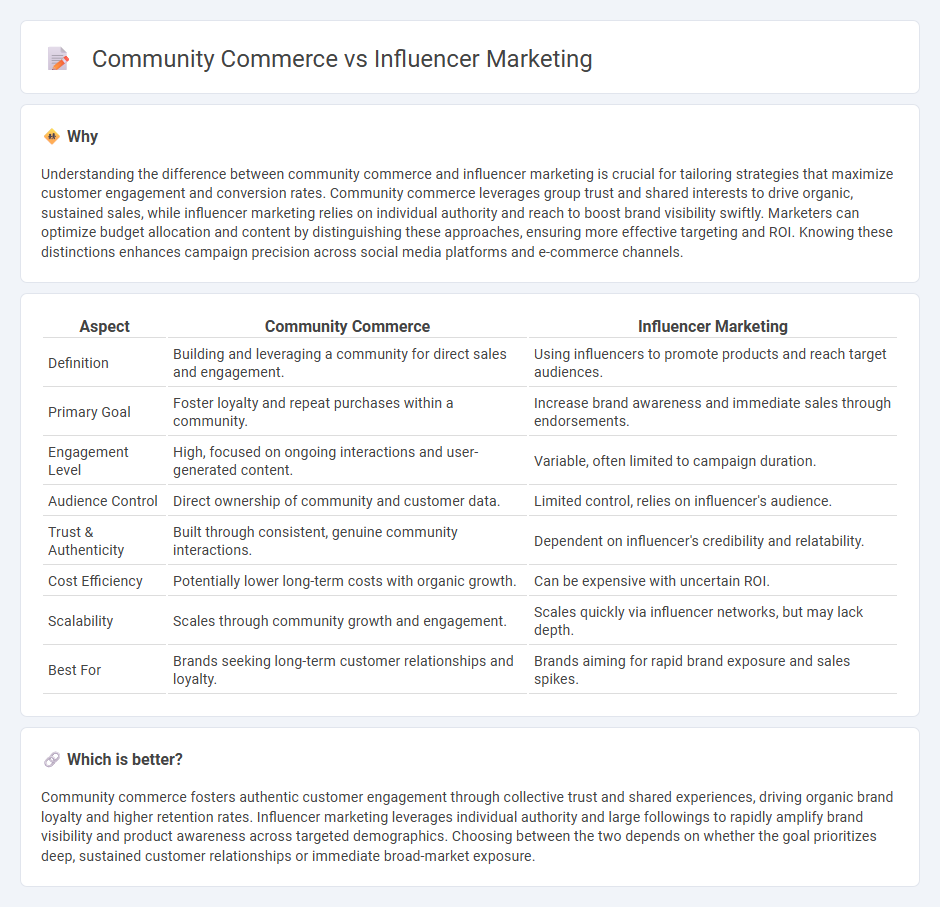
Community commerce leverages loyal customer groups to drive authentic, peer-driven sales through shared interests and trust. Influencer marketing focuses on partnering with influential individuals to amplify brand messages and capture wider audiences through their social reach. Discover how these strategies can elevate your brand's market presence.
Why it is important
Understanding the difference between community commerce and influencer marketing is crucial for tailoring strategies that maximize customer engagement and conversion rates. Community commerce leverages group trust and shared interests to drive organic, sustained sales, while influencer marketing relies on individual authority and reach to boost brand visibility swiftly. Marketers can optimize budget allocation and content by distinguishing these approaches, ensuring more effective targeting and ROI. Knowing these distinctions enhances campaign precision across social media platforms and e-commerce channels.
Comparison Table
| Aspect | Community Commerce | Influencer Marketing |
|---|---|---|
| Definition | Building and leveraging a community for direct sales and engagement. | Using influencers to promote products and reach target audiences. |
| Primary Goal | Foster loyalty and repeat purchases within a community. | Increase brand awareness and immediate sales through endorsements. |
| Engagement Level | High, focused on ongoing interactions and user-generated content. | Variable, often limited to campaign duration. |
| Audience Control | Direct ownership of community and customer data. | Limited control, relies on influencer's audience. |
| Trust & Authenticity | Built through consistent, genuine community interactions. | Dependent on influencer's credibility and relatability. |
| Cost Efficiency | Potentially lower long-term costs with organic growth. | Can be expensive with uncertain ROI. |
| Scalability | Scales through community growth and engagement. | Scales quickly via influencer networks, but may lack depth. |
| Best For | Brands seeking long-term customer relationships and loyalty. | Brands aiming for rapid brand exposure and sales spikes. |
Which is better?
Community commerce fosters authentic customer engagement through collective trust and shared experiences, driving organic brand loyalty and higher retention rates. Influencer marketing leverages individual authority and large followings to rapidly amplify brand visibility and product awareness across targeted demographics. Choosing between the two depends on whether the goal prioritizes deep, sustained customer relationships or immediate broad-market exposure.
Connection
Community commerce leverages the trust and engagement within online groups to drive purchasing decisions, creating a fertile ground for influencer marketing to thrive. Influencers act as authentic voices within these communities, amplifying brand messages and fostering deeper connections that translate into higher conversion rates. The symbiotic relationship between community commerce and influencer marketing enhances customer loyalty and accelerates organic growth through targeted, relatable content.
Key Terms
**Influencer Marketing:**
Influencer marketing leverages popular individuals with large followings on social media platforms to promote products or services, driving brand awareness and engagement through authentic content and trusted recommendations. This strategy relies heavily on the influencer's ability to create relatable storytelling that resonates with their audience, resulting in higher conversion rates and enhanced brand loyalty. Explore in-depth how influencer marketing can transform your brand's outreach and customer connection strategies.
Sponsored Content
Sponsored content in influencer marketing leverages individual creators to deliver authentic, personalized endorsements that drive engagement and brand loyalty. Community commerce, by contrast, integrates sponsored content within interactive group environments, fostering trust and collective purchasing decisions. Explore the nuances of sponsored content strategies to maximize your marketing impact.
Brand Ambassador
Brand ambassadors play a crucial role in influencer marketing by leveraging their personal credibility to promote products authentically across social media platforms, driving targeted engagement and brand awareness. In community commerce, brand ambassadors cultivate deeper customer relationships within niche groups, encouraging peer-to-peer recommendations and fostering loyalty that translates directly into sales. Explore how strategic brand ambassador programs can amplify both influencer marketing and community commerce efforts for your brand.
Source and External Links
Influencer marketing - Influencer marketing is a social media marketing strategy where brands collaborate with influencers, individuals with expert knowledge or social influence, to endorse products or services through posts on platforms like Instagram and TikTok, shaping consumer behavior through credible and authentic content.
What Is Influencer Marketing? - Influencer marketing enables businesses to partner with individuals who have a dedicated following to increase brand exposure, requiring clear goals, audience understanding, and budgeting for effective campaigns that focus on aligning influencers' audiences with brand targets.
All You Need to Know to Plan, Execute, and Generate ROI - Influencer marketing involves collaborating with professional influencers to boost brand reach and credibility, with strategies tailored to each social media platform and best practices focused on maximizing return on investment through carefully planned campaigns.
 dowidth.com
dowidth.com